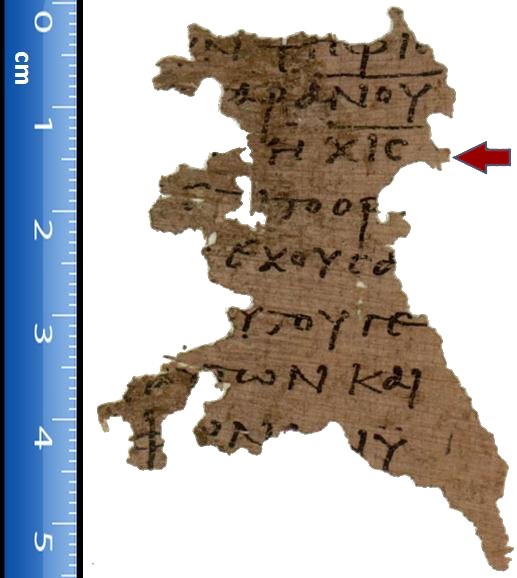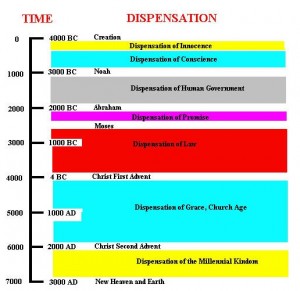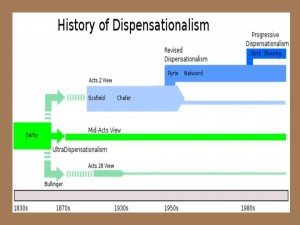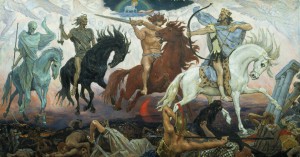
Papyri 115 one the most ancient examples of John’s Apocalypse
“It seems like through out time, almost everyone has thought the end was near, what makes you think now is the time?” a famous radio host asked me.
First, I believe God has wanted every Christian in every era to believe it’s possible. In juxtaposition, I believe the devil has had a “man of lawlessness” ready in the wings, in every generation. It’s not a doctrine but I’m rather prone to it. That said, there are unique things that characterize our current time that no other era could claim.
I was bit bewildered by the question because I had just explained that at no time in history-ever-could one man control the commerce of everyone, everywhere… But doesn’t the Bible imply as much?
“…and that no one was able to buy or to sell except the one who had the mark—the name of the beast or the number of his name. Here is wisdom: the one who has understanding, let him calculate the number of the beast, for it is man’s number, and his number is six hundred sixty-six.(Revelation 13:17-18,LEB)
Seriously, do preterists expect me to buy this applies to Nero? He had no hope of such control — sure he probably tried and it’s likely the convinced preterist has an example of a tax to present — but the text seems global -every nation and tongue- and it doesn’t seem to mention he is a miserable failure. I think it is forecasting this period we are now in… Moore’s law, the technological singularity, Noogenesis, Nirvana, Oneism, Coexist, perhaps even Together 2016? But such a control grid is about to be possible and my money is on OneWeb. I think they are a wise investment choice. I believe in them from a computer science technical perspective.
I’m not demonizing them, they want everyone to access  education, OneWeb is amoral – it is a category error to demonize technology. People can study wicca or they can attend online seminary if they like. They have new options, including the Gospel. So does the international banking community. I’m saying it makes an idea that seemed absurd when John wrote it down around AD 90, quite plausible in a few short years. Yes, I argue it is a “technology statement” as Chuck Missler points out.
education, OneWeb is amoral – it is a category error to demonize technology. People can study wicca or they can attend online seminary if they like. They have new options, including the Gospel. So does the international banking community. I’m saying it makes an idea that seemed absurd when John wrote it down around AD 90, quite plausible in a few short years. Yes, I argue it is a “technology statement” as Chuck Missler points out.
If you want to dig deeper in the biblical text, learn ancient languages. You need a minimum of a year in Hebrew and Greek to even understand the issues and questions being posed in academic journals of biblical studies. There’s a wealth of bible commentary and, my favorite, bible backgrounds commentary, i.e. advanced historical research available to the average student. At no other time in history, could you have a seminary library at your fingertips like today. I use Logos but there FREE versions and online 1; online 2; online 3; too. Technology can be wonderful and God honoring!
…and it is also terrifying.
This imagery from Hiroshima framed my childhood and, thus,the apocalyptic is no mere pipe dream. Now when we get to biblical prophecies and the end times, it can get tense between saved believers. Great scholars disagree. RC Sproul is a preterist. I purchased his philosophy course. I purchased his church history course. I quote him often. I respect him deeply. He has good reasons for what he thinks. I don’t agree with him. I quote Dr. Peter Jones—a Presbyterian no less–and promote his ministry TruthXchange. Chris Rosebrough —- a dreaded Lutheran — helped me prepare to debate Russ Hocus Pocus on the Trinity. How can I partner with people who differ with my eschatology? Its not as important as false teachers, sin, relativism, same sex marriage and abortion but mainly ONE thing: we all believe the Bible, we just disagree on the exegesis. But those guys have at least done the work in Greek and Hebrew,, Even so, (I’m in trouble now) their view of the Bible is not really the final test. There are hills to stand and die on. One is the Gospel. I work wit hose fellows because they are experts, but mainly because of ONE reason:
We are still in lock step on the Gospel —all are sinful and justified by faith through grace alone – the gift of God, so no man should boast. — non negotiable.
No one has the absolute answer to the end times, I have never claimed so much. If you want to understand the real issues — I recommend this:
I am a premillennial dispensationalist because I feel like its basic premise is the closest to God’s intent, but I’m not married to it, nor inclined toward rapture date setting theories and debates. If you’re correct, we’ll talk in the sky, OK? I learn from people with various ideas about eschatology, especially those I disagree with.
Don’t tell me you are SURE about the end times scenario. No one is but God. I write in a genre I call speculative eschatology. I am NOT a prophet.
I believe the meaning of scripture is determined by the intent of the original author, the one God inspired, to his original readers (i.e. what was Paul telling the Thessalonians, not me in the 20th century). That said, Paul’s intent for them certainly informs how I view current events.
Even so, God used that author’s context (in this case Paul), worldview, language, and even more importantly vocabulary. If you do not understand his perspective —a supernatural worldview informed by a divine council Deuteronomy 32:8 worldview— you often miss the point. I mean entirely. Understanding the vocabulary, means the first century meaning, the one the inspired author had in mind, because the Holy Spirit inspired the author and his words. Usually, scribes add to the text to “help” readers over time.
That’s how textual critics find the apostle’s words, they shave it down by comparing ancient papyri and determining the most likely original wording. It is established by facts that scribes tend to add, attempting to clarify—asserting their own meaning—and, as a result, the manuscripts tend to get wordier over time. With the best of intentions, monks changed the Bible. Then, after the reformation began, it became the KJV when a Catholic Scribe Erasmus created a Greek New testament based on a handful of Greek manuscripts from the 8-9th century of the Eastern Byzantine tradition. It became Texts Receipts after the 1611 KJV Anglicans used it as their primary text along with the Latin Vulgate and Tyndale Bibles. It was great fro its time but pre- archeology.
Since then we have found 20,000 or so Greek papyri centuries older…. Archeology is now a discipline with peer review.
It means modern Bibles are very accurate and we have a great deal of certainty about the Gospel and many essential doctrines. The evidence Jesus rose from the dead is now MORE compelling—and that lends credence to the rest of biblical theology-—we stand at the first time in history when the supernatural events of Revelation have a high probability of coming to pass, WHY?
The “Chardinian Noosphere” or “AI Singularity” is about to make it possible for one man to control all who may buy and sell, I mean everyone.. even in rural India or subsaharan Africa. How can I say that — get ready (link to company website):









